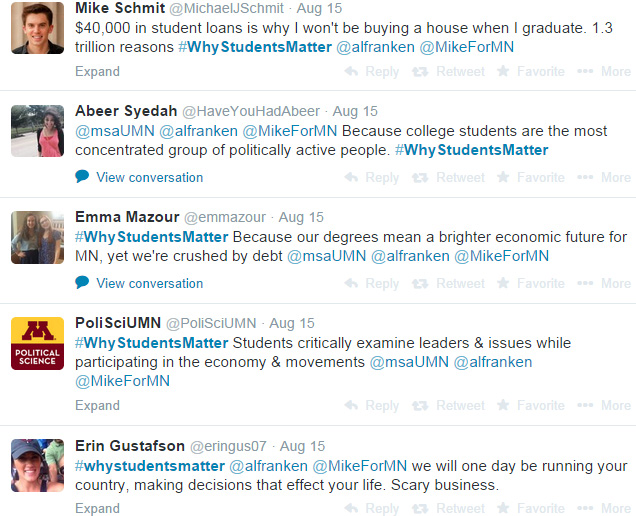If there is one likely loser in this campaign season, it’s the political debate, the traditional chance for interested voters to size up two (or more) candidates at the same time.
Sen. Al Franken, the DFL incumbent, refused to participate in the traditional State Fair debate sponsored by MPR. And today, Minnesota Daily reports he’s turned down a request from Minnesota Student Association to debate.
“We’re incredibly disappointed that Sen. Franken turned us down,” MSA President Joelle Stangler told the paper. The MSA had launched a Twitter campaign to try to convince him to debate. It didn’t work.
“He believes in debates and will participate in a total of four debates this election, as his first goal is to communicate with Minnesota voters,” a Franken campaign spokeswoman said.
The party line these days is debates don’t work anymore, at least depending on if you believe the purpose of a debate is to get elected.
“Candidates care about groups that show up to vote,” political scientist Larry Jacobs said. Students don’t show up. That’s on them.
This has been a long time coming. If political debates are dying, blame the people who organized and hosted them. The traditional format is boring, and it allows candidates to blandly drop stump speeches on the audience. The moderator and questioners are often a members of the news media, who are too worried about being perceived as biased to ask tough or imaginative questions, and are reluctant to say “you didn’t answer my question” or — even worse — challenge a candidate on an actual fact.
Campaigns have wagged the dog by insisting on a particular format or moderator, and the organizers have shied from challenging their demands.
It’s not just Minnesota and not just Franken and Gov. Mark Dayton who are reluctant to debate. In Texas, a Republican candidate for governor reneged on a debate this week with Democrat Wendy Davis. Why shouldn’t he? He’s probably going to win.
The Texas Tribune, which was one of the debate sponsors, didn’t seem to blame him much.
Here’s the thing about debates, forums and conversations and whatnot. If your concern is purely competitive — as it is for candidates and the people who work for them — these public appearances are full of opportunity and risk. Underdogs want more debates, so that voters might notice them or front-runners might stumble. Front-runners want fewer of them — for exactly the same reasons.
If your concern is more consumer-oriented — as it is for voters who want to make sure that they are putting the right people in office and that those people know what it is that the voters want — events like these offer a chance to compare and contrast the people seeking office. That one is smart. This one is a jerk. That other one is pretty weird, but charismatic.
Game-changing debates are relatively rare, but debates often produce moments that are important even when they don’t determine the outcome of races. Gov. Rick Perry’s famous “oops” moment during the last presidential primaries was not when his campaign actually came to pieces. His standing among the candidates had already dropped dramatically as voters became concerned about whether he was prepared for the job. “Oops” was mere punctuation, an accident that brought those concerns into sharp focus.
No doubt Franken and Dayton will appear in some debates as they’ve promised, though it’s unclear which ones. Let’s hope it’s the ones where where the organizers aren’t as timid as the candidates.

